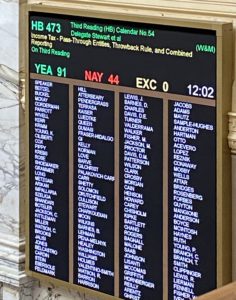Pandemic Emphasizes the Need to Clean Up Maryland’s Tax Code and Invest in Community Needs
As we navigate the uncertainty of this global pandemic, Marylanders are counting on their state and local governments more than ever.
We are counting on our public services to help keep everyone safe and healthy, and to ensure that families don’t go hungry or lose their housing as their paychecks shrink or disappear. Hundreds of thousands of jobs depend on the continued delivery of state and local services and so do the local businesses those workers support. This means that significant public investment is necessary to prevent further deepening of the wealth gap and to get our economy going again, once this public health crisis has passed.
To date, our state-level policymakers have passed legislation, promulgated rules, and issued executive orders to “flatten the curve,” rescue small businesses, and most importantly, protect Marylanders, during these unprecedented and volatile times. However, one thing is clear – the economic effects of COVID-19 will be widespread and hit Maryland’s most disadvantaged populations the hardest.
That is why new revenue measures will prove critical to ensure that our state’s economy and residents remain resilient. This year, the legislature took a couple of small steps to raise revenue and update our tax system to reflect our modern economy, but left bigger reforms on the table.
Our state must address the flaws in our tax system in order to meet the needs of Maryland’s working families during this crisis without cutting back on our state’s investments in good schools, effective transportation networks, and other public services. These services are the foundation of our economy, and so are the family-supporting jobs those services support. As soon as it is safe to gather, the legislature should reconvene in a special session to ensure we have the revenue needed to support the pandemic response and maintain other essential services.
What Passed
The legislature passed several bills that were originally drafted to support the Blueprint for Maryland’s Future but were amended to first fund the response to the COVID-19 pandemic, fill emergency reserves, and provide additional funding to Maryland’s historically Black colleges and universities. The package primarily focuses on broadening consumer taxes to reflect our modern economy, rather than closing corporate tax loopholes or making our tax system more equitable.
- Creating a new gross receipts tax on digital advertising sellers. This bill was designed to primarily affect the largest digital advertising companies, like Google and Facebook. While this is an innovative approach to ensure these newer corporations are contributing to public services in Maryland, revenue is likely to be delayed as legal questions are resolved.
- Increasing tobacco taxes and expanding them to include vaping products.
- Expanding the sales tax to include digital goods like ebooks, video game downloads, and streaming services.
- Putting a referendum on the fall ballot to legalize sports betting.

What Was Left on the Table
A legislative package to clean up our tax code and close corporate loopholes was introduced in the Maryland General Assembly and strongly supported, but did not fully pass before the legislative session ended. Those legislative proposals were:
- Closing loopholes to make sure large corporations pay taxes on all their Maryland profits just like our small local businesses do, and can’t use accounting gimmicks to avoid their tax responsibility.
- Ending ineffective business tax credits.
- Fixing our upside-down tax code to ensure the wealthiest Marylanders who now pay the smallest share of their income in state and local taxes, are paying their fair share like Maryland’s working families are.
These proposals to clean up our tax code and close loopholes gathered more steam than ever before, with several bills passing the House of Delegates. However, these options to raise significant revenue did not receive final action in the Senate—partly due to the abruptly shortened session, and partly because of many policymakers’ misguided reluctance to raise new revenue during an economic downturn.
What’s Next
The long-term impact of the COVID-19 pandemic on Maryland’s state economy still remains to be seen, as the state’s policymakers prioritize how funding should be spent. However, we do know that our state cannot afford to continue to leave revenue on the table. In February, we released a report on Maryland’s missed opportunity to raise $2.8 billion in revenue for the state.
It is expected that our state will lose upward of 300,000 jobs by summer. Thousands of small businesses already have no choice but to halt or cut back operations, and many may not be able to withstand the loss of income.
The evidence makes clear that we can maintain essential public services, protect billions in wages for working families, and strengthen our economy by improving our tax code, especially by asking more of large corporations and wealthy individuals. This is because cutting state services would unavoidably require laying off or furloughing large numbers of public employees who currently make a decent, but not extravagant, living. These workers would have little choice but to cut back on necessities, harming sales at local businesses. On the other hand, wealthy individuals are more likely to have significant savings and therefore do not change their spending habits as strongly in response to a change in income. In fact, economic research out of Johns Hopkins University confirms that individuals with significant built-up assets are the least likely to change spending habits when their income changes.
Our legislators must revisit the various revenue raising options that were left on the table during the Maryland General Assembly’s special session, tentatively scheduled for the end of May.
Our state must respond to the realities of our changed economy. Sound, sufficient, and sustainable proposals that raise revenue should be considered and put in place to fairly invest in Maryland’s future. We truly cannot afford to miss another bite at the apple to grow Maryland’s economic pie.
